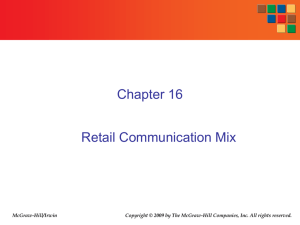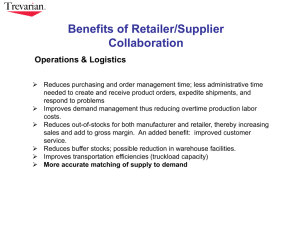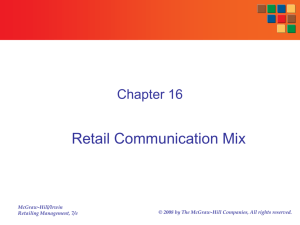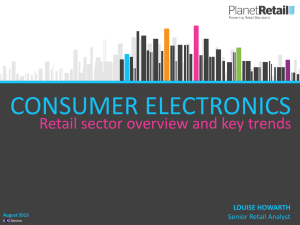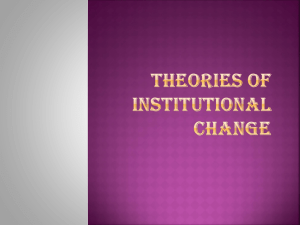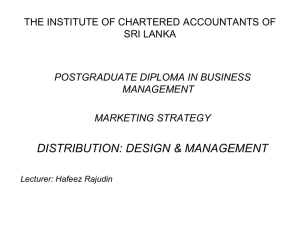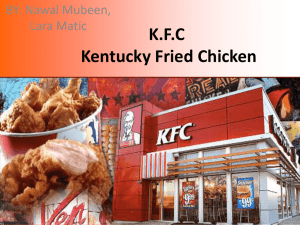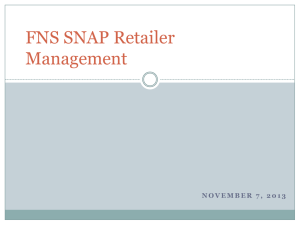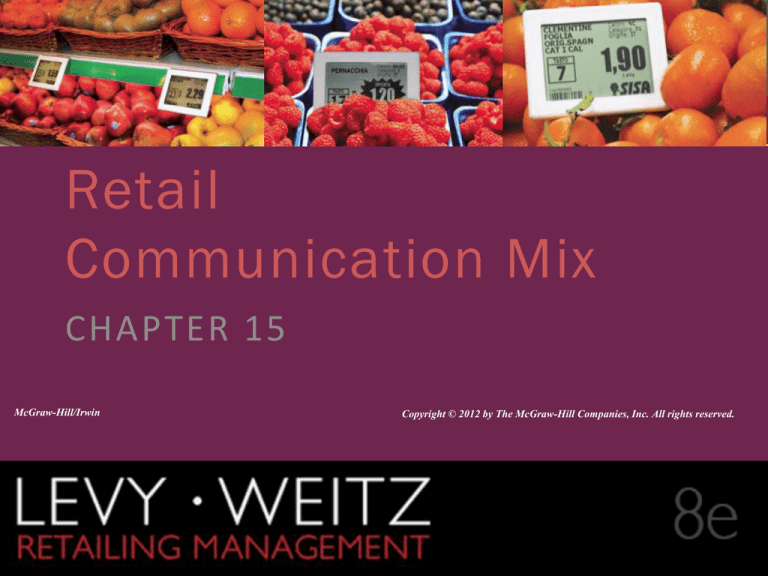
CCHHAAPPTTEERR 11
25
Retail
Communication Mix
CHAPTER 15
McGraw-Hill/Irwin
Retailing Management 8e
Copyright © 2012 by The McGraw-Hill Companies, Inc. All rights reserved.
© The McGraw-Hill Companies, All rights reserved.
15 - 1
Merchandise Management
CCHHAAPPTTEERR 11
25
Managing the Merchandise Planning Process
Buying Merchandise
Retail Pricing
Retail Communication Mix
15 - 2
Brands
CCHHAAPPTTEERR 11
25
Distinguishing name or symbol, such as a logo, that
identifies the products or services offered by a seller
and differentiates those products and services from
those offered by competitors
The McGraw-Hill Companies, Inc./John Flournoy, photographer
The McGraw-Hill Companies, Inc./Bob Coyle, photographer
15 - 3
Value of Brand Image
CCHHAAPPTTEERR 11
25
Value to Retailers (Brand Equity)
Value to Customers
• Attract Customers
• Build Loyalty
• Higher Prices Leading to
Higher Gross Margin
• Reduced Promotional Expenses
• Facilitates Entry into New Markets
Gap GapKids
• Promises Consistent Quality
• Simplifies Buying Process
• Reduces Time and Effort Searching for
Information About
Merchandise/Retailer
15 - 4
Building Brand Equity
CCHHAAPPTTEERR 11
25
Create a High
Level of Brand
Awareness
Consistent
Reinforcement
Brand
Equity
Develop
Favorable
Associations
Create
Emotional
Connections
15 - 5
Benefits of High Brand Awareness
Aided Recall Top
Mind Awareness
CCHHAAPPTTEERR 11
25
Stimulates Visits
to Retailer
15 - 6
Creating Brand Awareness
CCHHAAPPTTEERR 11
25
Memorable
Name
Best Buy
Repeated
Exposure
Home Depot
Top-of-mind
Brand Awareness
Starbuck’s
Symbols
Macy’s
Event
Sponsorship
15 - 7
Consistent Reinforcement through Integrated
Marketing Communication Program
CCHHAAPPTTEERR 11
25
Integrated Marketing Communication Program
• A program that integrates all of the communication
elements to deliver a comprehensive, consistent
message
• Providing a consistent image can be challenging for
multichannel retailers – Need to consider the needs of
all channels early in the planning of its communication
program
15 - 8
Integrated Marketing Communications
CCHHAAPPTTEERR 11
25
• Present a Consistent Brand Image through all
Communications with Customers
•Store Design
•Advertising
•Web Site
•Magalog
The McGraw-Hill Companies, Inc./Andrew Resek, photographer
15 - 9
Brand Extensions
CCHHAAPPTTEERR 11
25
• Gap GapKids and Old Navy
• Abercrombie & Fitch Hollister and Gilly Hicks
• Sears Sears Auto Centers and the Great Indoors
• Pottery Barn Pottery Barn Kids
The McGraw-Hill Companies, Inc./Andrew Resek, photographer
15 - 10
Methods of
Communicating with Customers
CCHHAAPPTTEERR 11
25
15 - 11
Any brochure,
catalog,
advertisement,
or other printed
marketing
material
delivered directly
to the consumer
through the mail
or a private
delivery
company.
CCHHAAPPTTEERR 11
25
E-mail
Direct mail
Direct Marketing
Can be
personalized to
the specific
consumer and
thus is similar to
communications
delivered by
salespeople.
15 - 12
Direct Marketing
CCHHAAPPTTEERR 11
25
• Mobile marketing is
marketing through
wireless handheld
devices, such as
cellular telephones,
and m-commerce or
mobile commerce
involves completing a
transaction via the cell
phone.
15 - 13
Online Marketing
CCHHAAPPTTEERR 11
25
Web Sites
Blogs
15 - 14
Social Media
CCHHAAPPTTEERR 11
25
15 - 15
Sales Promotions
CCHHAAPPTTEERR 11
25
15 - 16
Personal Selling
CCHHAAPPTTEERR 11
25
• A communication process in which sales associates help
customers satisfy their needs through face-to-face
exchanges of information.
15 - 17
Advertising
CCHHAAPPTTEERR 11
25
Newspapers
Co-op
Programs
Radio
Magazines
Television
15 - 18
Public Relations (PR)
CCHHAAPPTTEERR 11
25
• Managing communications and relationships to achieve
various objectives
• Building and maintaining a positive image of the
retailer
• Handling or heading off unfavorable stories or events
• Maintaining positive relationships with the media
• In many cases, public relations activities support other
promotional efforts by generating “free” media attention
and general goodwill.
15 - 19
Planning the
Retail Communication Program
CCHHAAPPTTEERR 11
25
15 - 20
Establish Objectives
CCHHAAPPTTEERR 11
25
• Communication objectives:
• Specific goals related to the retail communication mix’s
effect on the customer’s decision-making process
• Long-term: ex. creating or altering a retailer’s brand
image
• Short-term: ex. increasing store traffic
15 - 21
Determine the Communication Budget
CCHHAAPPTTEERR 11
25
• Marginal Analysis Method
• Based on the economic principle that firms should
increase communication expenditures as long as each
additional dollar spent generates more than a dollar of
additional contribution
• Very hard to use because managers don’t know the
relationship between communication expenses and
sales
15 - 22
Marginal Analysis for Setting Diane
West’s Communication Budget
CCHHAAPPTTEERR 11
25
15 - 23
Objective-and-Task Method
CCHHAAPPTTEERR 11
25
• Determines the budget required to undertake specific
tasks to accomplish communication objectives
15 - 24
Illustration of Objective and Task
Method for Setting a Communication Budget
CCHHAAPPTTEERR 11
25
15 - 25
Financial Implications of Increasing the
Communication Budget
CCHHAAPPTTEERR 11
25
15 - 26
Rule of Thumb Methods
CCHHAAPPTTEERR 11
25
• Affordable Budgeting Method – sets communication
budget by determining what money is available after
operating costs and profits are budgeted.
• Drawback: The affordable method assumes that the
communication expenses don’t stimulate sales and
profits.
15 - 27
Rule of Thumb Methods
CCHHAAPPTTEERR 11
25
• Percentage of Sales Method – communication budget is
set as a fixed percentage of forecasted sales.
• Drawback: This method assumes the same percentage
used in the past, or by competitors, is still appropriate
for the retailer.
15 - 28
Rule of Thumb Methods
CCHHAAPPTTEERR 11
25
• Competitive Parity Method – this communication budget
is set so that the retailer’s share of communication
expenses equals its share of the market.
• Drawback: This method (like the others) does not allow
the retailer to exploit the unique opportunities or
problems they confront in a market.
15 - 29
Allocate the Promotional Budget
CCHHAAPPTTEERR 11
25
• The retailer decides how much of its budget to allocate
to specific communication elements, merchandise
categories, geographic regions, or long- and short-term
objectives
• Budget allocation decision is more important budget
amount decision
High-assay principle: The retailer allocate the budget to
areas that will yield the greatest return
15 - 30
Sales Promotion Opportunity
CCHHAAPPTTEERR 11
25
• Many sales promotion opportunities undertaken by
retailers are initiated by vendors
• To evaluate a trade promotion, the retailer considers:
• Realized margin from the promotion
• Cost of the additional inventory carried
• Potential increase in sales
• Potential loss
• Additional sales
15 - 31
Keywords
CCHHAAPPTTEERR 11
25
• objective-and-task method A method for setting a
promotion budget in which the retailer first establishes a
set of communication objectives and then determines
the necessary tasks and their costs.
15 - 32

